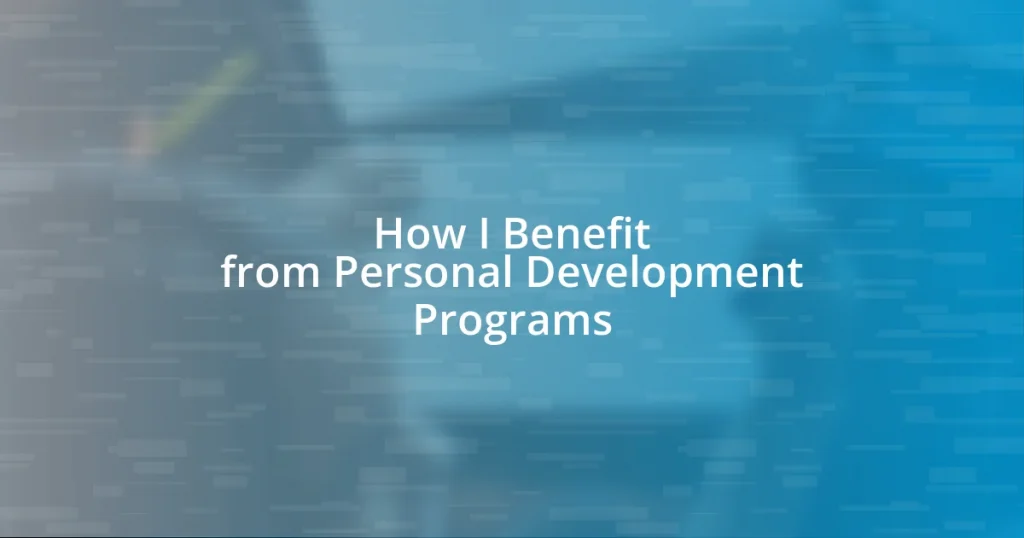Key takeaways:
- Personal development programs enhance skills, self-awareness, and overall well-being, fostering significant personal growth.
- Setting specific, measurable goals and tracking progress are crucial for accountability and achieving desired outcomes in personal development.
- Maintaining long-term growth involves regular self-reflection, surrounding oneself with growth-minded individuals, and practicing self-compassion during setbacks.
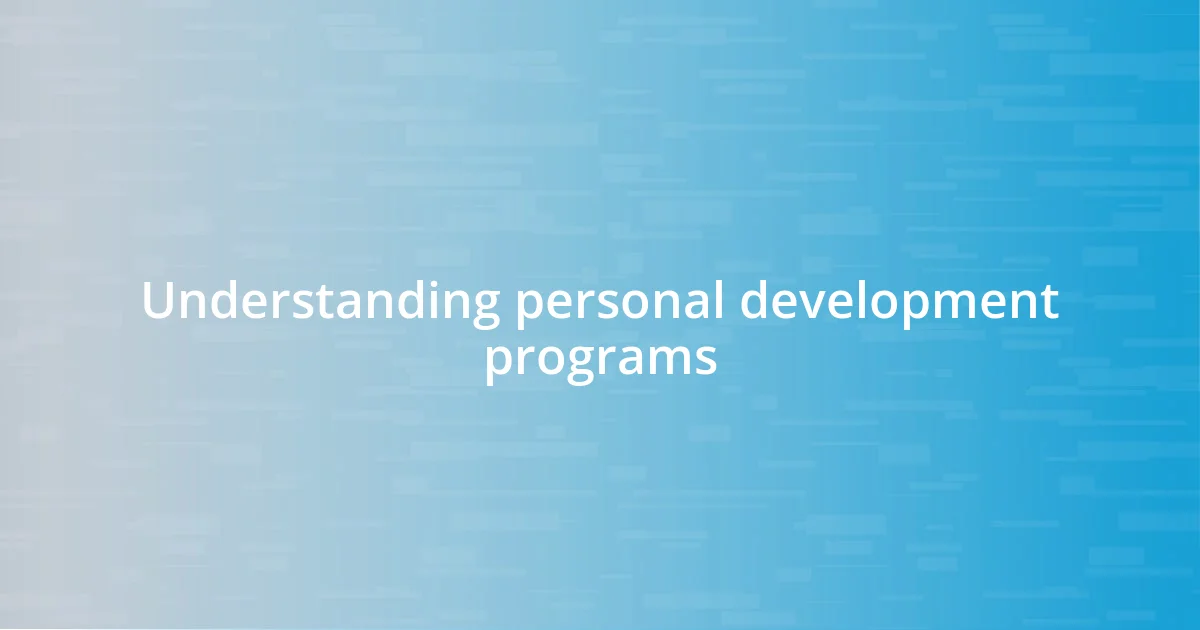
Understanding personal development programs
Personal development programs are structured initiatives designed to enhance one’s skills, mindset, and overall well-being. I remember the first time I enrolled in a workshop focused on emotional intelligence; I was genuinely surprised by how much it reshaped my outlook on personal interactions. Isn’t it fascinating that a few hours of guidance can stir such transformative realizations in our lives?
These programs often encompass various aspects like goal-setting, time management, and self-awareness, creating a holistic environment for growth. Reflecting on a mentor I had years ago, they emphasized the importance of tracking our progress, which truly resonated with me. Have you ever felt the exhilaration of accomplishing a goal you set for yourself after deliberate effort? It’s that sense of fulfillment that keeps me coming back to workshops and training sessions.
In my experience, engaging in personal development is not just about acquiring new skills—it’s about rediscovering who we are and what we can become. I still vividly recall a networking event that sparked connections leading to unexpected opportunities in my career. Isn’t it rewarding to think that investing in ourselves can ripple out, impacting not only our lives but also the lives of those around us?
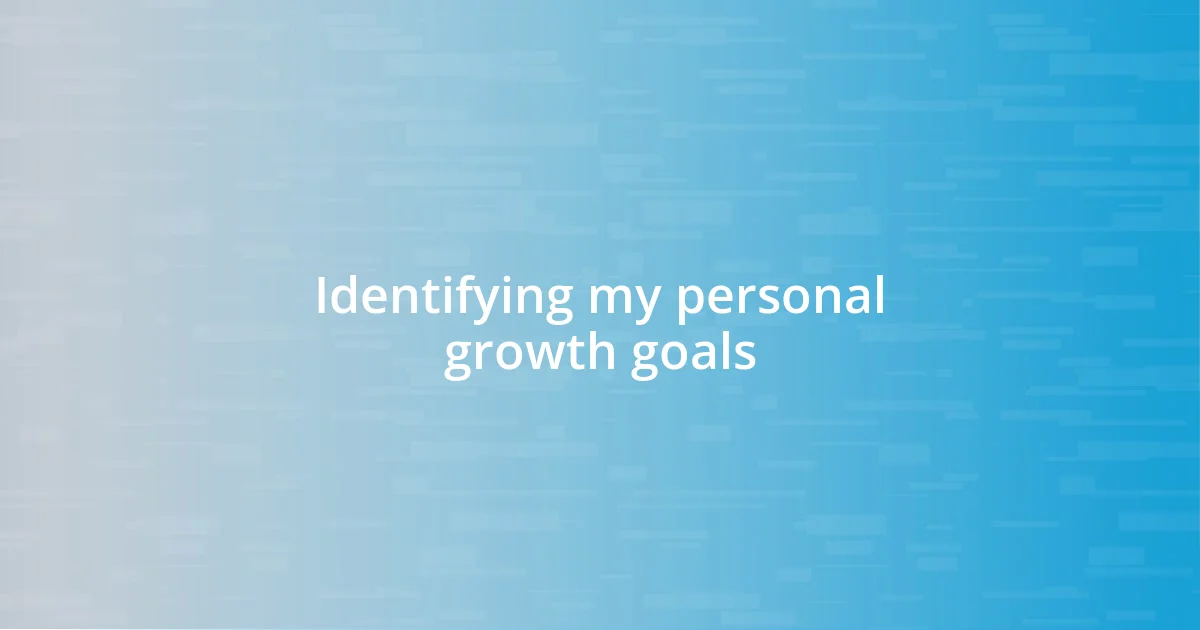
Identifying my personal growth goals
Identifying my personal growth goals is an essential first step in my journey. I often find myself reflecting on what areas I want to develop, whether it’s enhancing my communication skills or improving my resilience. Just the other day, I sat down with a journal, jotting down my thoughts and aspirations. It struck me how, in clarifying these goals, I can visualize the future I want to create. Have you ever written down your ambitions? The process can be both enlightening and motivating.
As I navigate through different personal development programs, I realize that setting specific, measurable goals makes all the difference. I recall a time I aimed to read one personal development book each month, sharing insights with a friend. This made the experience even richer, as we engaged in meaningful discussions, while also holding each other accountable. What activities or goals have you set that have brought you closer to your vision? Accountability can truly amplify our growth.
Lastly, I have learned that revisiting my goals periodically is crucial as they might shift over time. I remember when I initially prioritized career advancement, but as I grew, my focus transitioned toward work-life balance. It was eye-opening! I encourage you to embrace change and be adaptable; growth isn’t linear. What new realizations have guided your path? Reflecting on these questions can lead to even deeper insights about your journey.
| Goal Type | Description |
|---|---|
| Short-term Goals | Focused objectives that can be achieved in the near future, such as completing a specific course. |
| Long-term Goals | Broader aspirations that require time and commitment, like developing a new skill set or mastering a subject. |
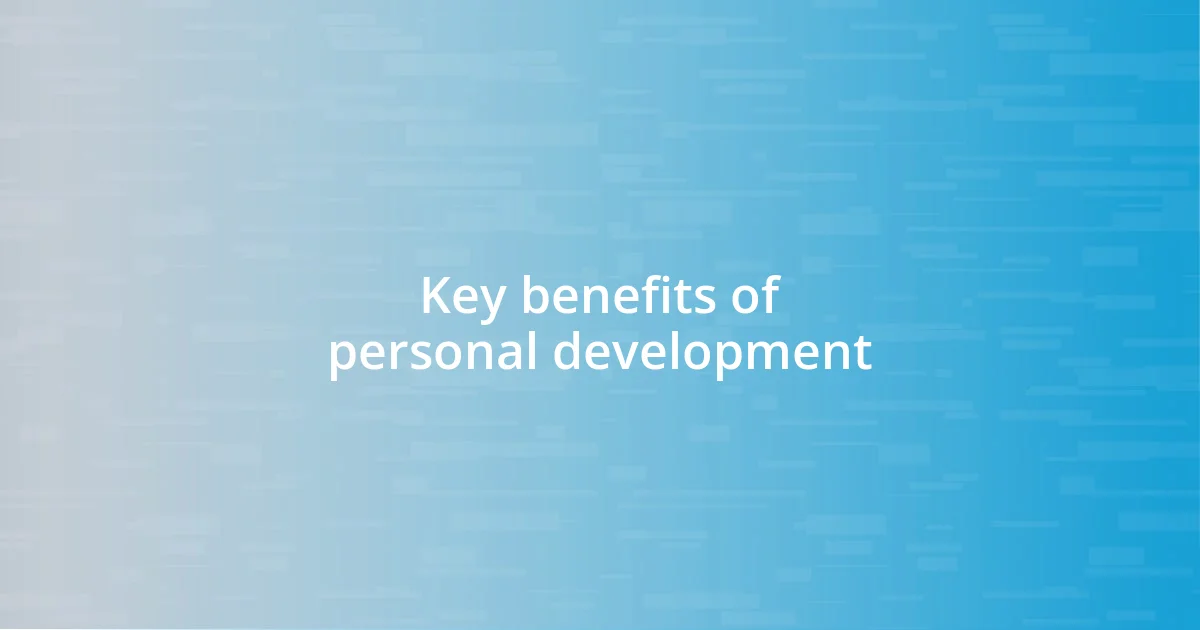
Key benefits of personal development
Personal development opens doors to numerous advantages that can significantly enhance one’s life. One of the notable benefits I’ve experienced is improved self-awareness. I recall attending a seminar where we examined our core values. That evening, I went home deeply reflective—realizing how my values didn’t align with my daily actions. It was a powerful moment; I felt a renewed sense of clarity and purpose that I hadn’t had before.
Here are some key benefits of personal development:
- Enhanced Self-Confidence: Gaining new skills often translates into a stronger belief in oneself.
- Improved Relationships: Developing emotional intelligence can lead to healthier interactions with others.
- Goal Clarity: Well-structured programs help crystallize what we truly want in life.
- Resilience: Facing challenges in a supportive learning environment builds our capacity to cope with setbacks.
- Continuous Learning: Engaging in various programs fosters a mindset of curiosity and growth.
Furthermore, a significant aspect of personal development is its potential to foster better time management. I remember a workshop focused solely on prioritizing tasks. The strategies we learned were so effective that I could feel an immediate shift in my productivity. Suddenly, I was able to manage my time more wisely, leaving space for both work and personal life. The relief of redeeming those lost hours was incredibly rewarding!
Embracing personal development means inviting these benefits into your life, allowing you to evolve in meaningful ways.
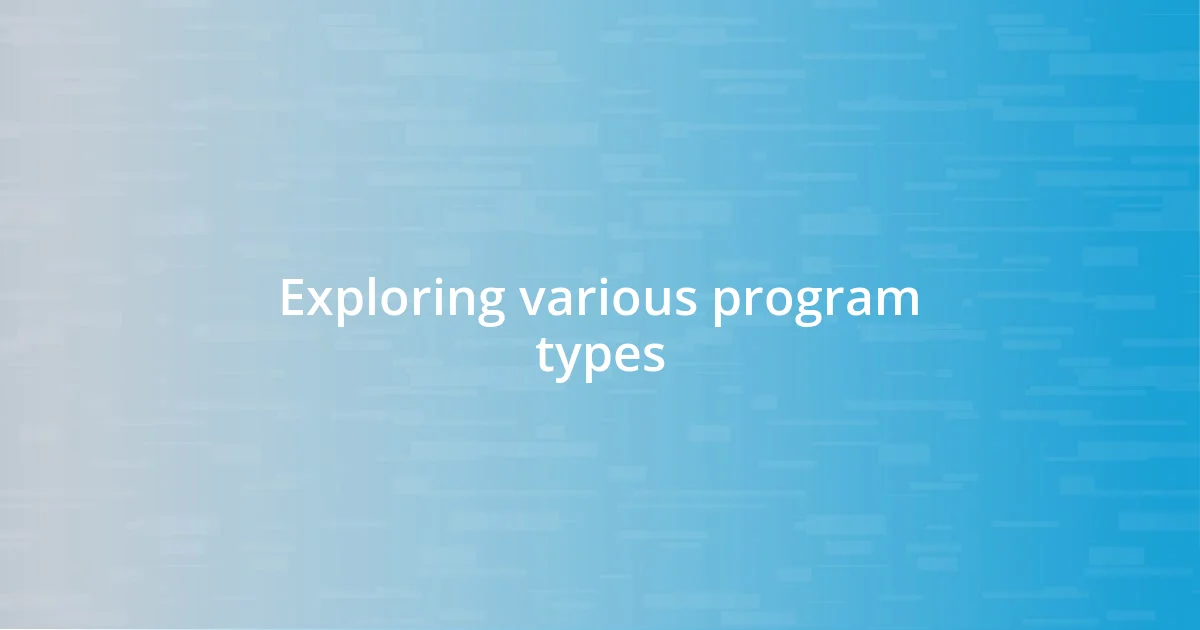
Exploring various program types
When I think about the different types of personal development programs, I see a landscape filled with diverse opportunities. For instance, attending workshops focused on specific skills can be incredibly enriching. I remember one that delved into public speaking; not only did I learn valuable techniques, but the supportive atmosphere helped me conquer my fear of speaking in front of others. Have you ever faced a fear head-on? The feeling of triumph and newfound confidence can be exhilarating.
Another program type that has had a profound impact on my journey is online courses. These allow for flexibility and self-paced learning, which is ideal for someone juggling multiple commitments. I enrolled in a course on emotional intelligence that I could tackle during my lunch breaks. Not only did I deepen my understanding, but the insights from those lessons began to positively affect my interactions at work. How do you prefer to learn? Understanding your style can help you select the right program.
Group coaching sessions stand out to me as well. They offer an opportunity for collaboration and feedback from others on similar journeys. I recall a session where sharing personal struggles created a sense of camaraderie—it was amazing to learn from others’ experiences. The moment I realized we’re all in this together was heartwarming and empowering. What has been your experience in group settings? These environments can foster a rich exchange of ideas and support.
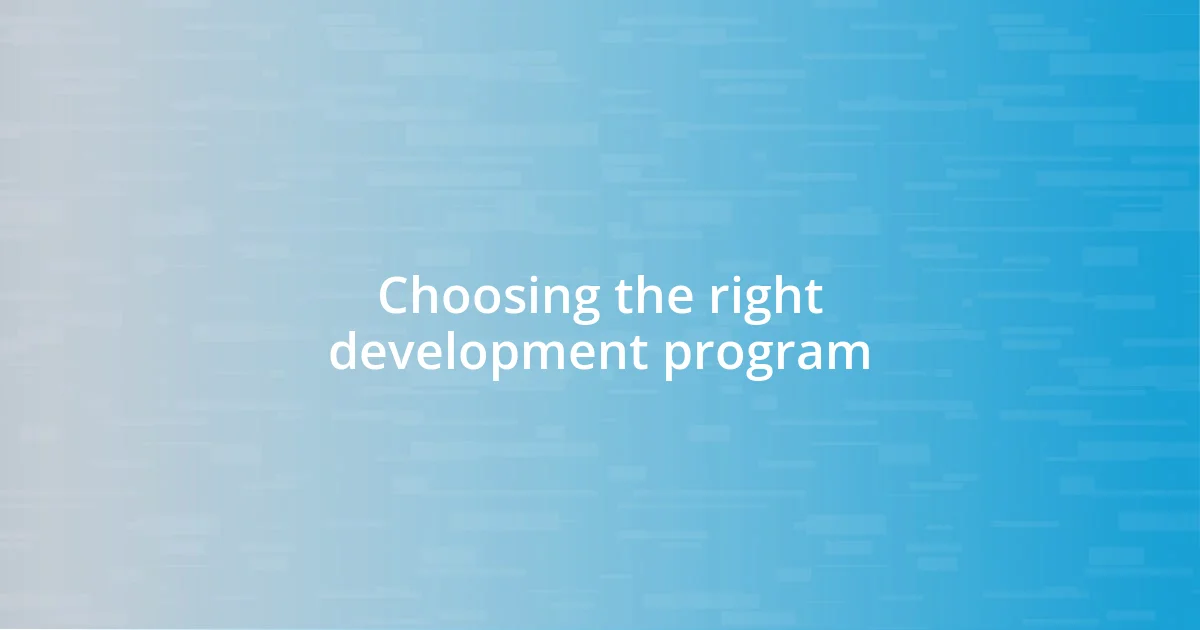
Choosing the right development program
Selecting the right personal development program can feel daunting, but it truly boils down to knowing yourself. When I was exploring options, I took time to reflect on my goals and what specific skills I wanted to develop. Have you ever paused to consider what you genuinely want to achieve? It was a game-changer for me to write down my aspirations, leading me to a program focused on leadership skills that really met my needs.
It’s also essential to consider how the program’s format aligns with your lifestyle. I remember being torn between a weekend workshop and an online format. Ultimately, I chose the online program because it allowed me to absorb the material at my own pace. This flexibility meant I could revisit challenging concepts when I had the energy and time. Have you experienced a learning situation where the timing made all the difference?
Another key aspect is to research the instructors and their backgrounds. I once joined a program led by a renowned coach whose personal story deeply resonated with me. Listening to her share her challenges and triumphs made the content more relatable and inspiring. I felt more connected to the learning process because I could see a path of transformation mirrored in her journey. Isn’t it powerful to learn from someone who has walked a similar path? It truly adds a personal touch to the experience.
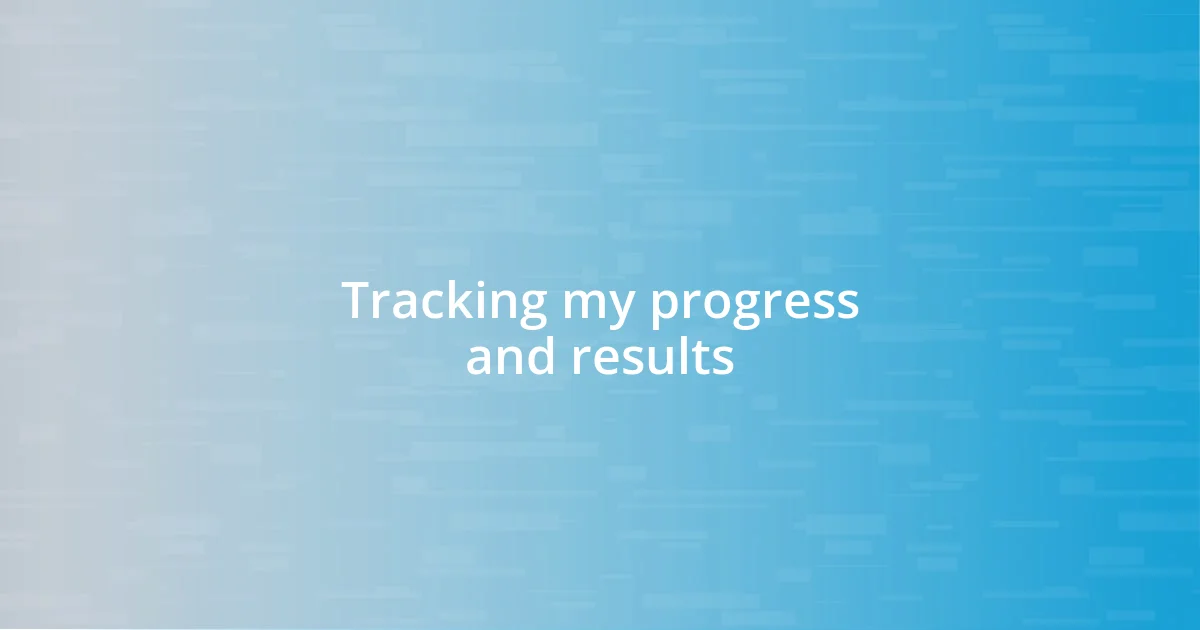
Tracking my progress and results
Once I started tracking my progress in personal development programs, everything changed. I used a simple journal to note down my thoughts and feelings after each session. This started as an experiment, but over time, it became a vital tool for reflecting on what resonated with me. I could visually see my growth, and that sense of accomplishment motivated me to keep pushing forward. Have you ever realized how powerful it is to see your own journey in writing?
Another way I’ve tracked my results is through setting specific milestones. For instance, after completing my emotional intelligence course, I aimed to apply what I learned in real-life discussions and gauge the changes in my relationships. Noticing how my conversations flowed more smoothly was rewarding. In that moment, I felt like I was truly transforming not just as an individual but also in how I connected with others. Isn’t it fascinating how measuring small wins can change your perspective on progress?
Finally, I’ve found that sharing my progress with a trusted mentor or friend enhances my accountability. I remember one coaching program where I discussed my goals every week with a buddy. This exchange not only held me accountable but also provided invaluable feedback on my blind spots. Those conversations often sparked new ideas and strategies that I had overlooked. Have you considered how having someone to share your journey with could enhance your progress?
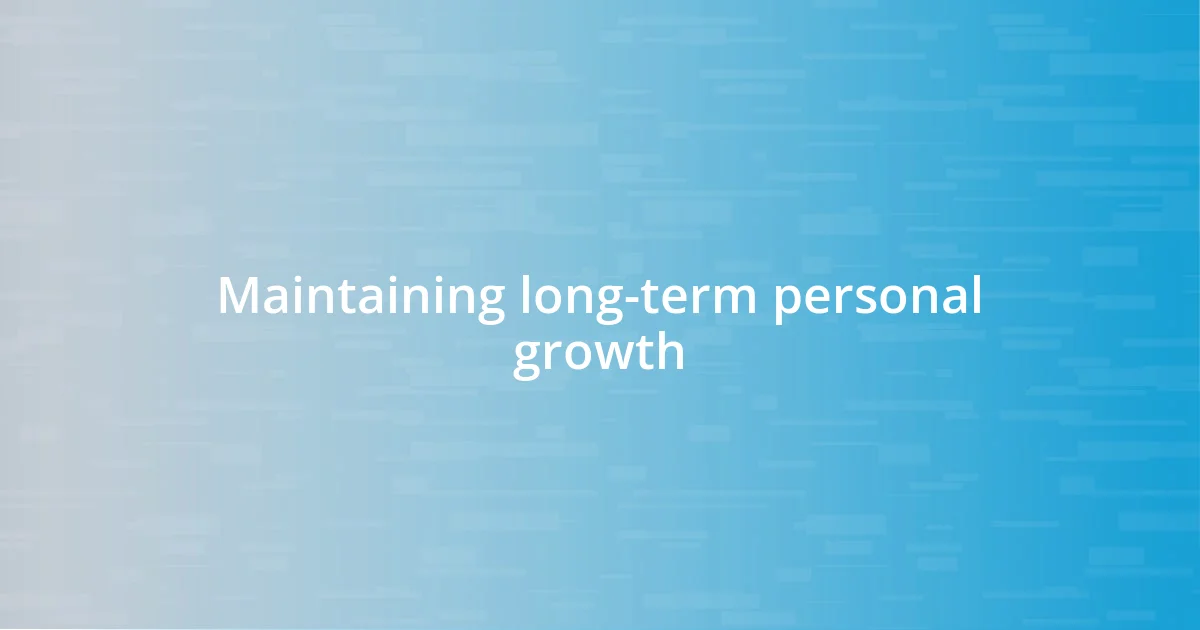
Maintaining long-term personal growth
Continuing my journey in personal development isn’t just about diving into new programs; it’s about cultivating habits that foster long-term growth. For instance, I made it a practice to set monthly reflections where I assess my progress and adjust my goals. This habit was inspired by a remarkable mentor who encouraged me to view growth as a continuous journey rather than a destination. Have you ever noticed how regular self-assessment can expose blind spots you didn’t even know existed?
Beyond self-reflection, I found that surrounding myself with growth-minded individuals has a profound impact on my trajectory. There was a time I joined a book club focused on personal development literature. Discussing insights with others not only deepened my understanding but also sparked new ideas I hadn’t considered before. It’s incredible how the energy of like-minded people can rejuvenate your motivation, isn’t it?
Moreover, I’ve learned the importance of being patient and compassionate with myself throughout this process. There were moments when I felt stagnant, and I found it easy to get discouraged. However, I reminded myself that growth isn’t linear. Adopting a mindset of self-compassion allowed me to embrace setbacks as part of the journey. How often do we forget that it’s okay to pause, regroup, and come back stronger?











